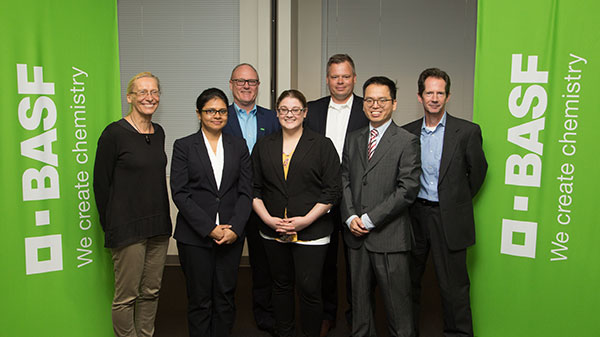NC State Research Students Help Uncover Sensor Technology

Contestants from left to right: Marzana Mantasha Mahmud, Dr. Nasie Constantino, Chunkyun Seok
A new way for growers to detect biotic stress in plants
The health of a plant is complex and continues to be influenced by factors such as drought, insects and metabolic changes. The agriculture industry is particularly interested in finding ways to identify plant responses to biotic factors (especially pathogens and insects). Specifically needed within the industry is a real-time, versatile sensing technology that is not restricted to use within a laboratory setting, like many existing technologies are.
The Shark Tank
BASF is always striving to offer growers Plant Health benefits, including disease control, stress tolerance and growth efficiency. To generate innovative technology that could benefit growers’ crops, BASF recently invited research students from North American universities to participate in the 2018 BASF Science Competition. The challenge? To develop sensor technology that can detect and diagnose Plant Health and plant stress response in real-time.
Thirteen teams submitted their scientific abstracts to a group of BASF experts, who then evaluated each submission for its novelty, scientific and business merit, as well as technical feasibility. Of the thirteen entries, three separate teams from North Carolina State University, Purdue University and the University of Massachusetts made it to the final round. These talented academics were given the chance to work with BASF researchers, coaches and executives, to help further develop their ideas.
NC State Winners
The team from NC State was selected as the overall winning team. Their proposed technology was based around capacitive micro-machined ultrasonic transducers (CMUT) working to rapidly detect and identify plant-sourced volatile organic compounds (VOCs). The team created a unique and innovative real-time sensor system that, after further development, could potentially be used to enhance and improve a grower’s ability to produce healthier and more robust crops.
“When it comes to field-based tools for detecting factors that affect Plant Health, our industry is experiencing a deficit,” said Bozeman. “This competition provided a unique opportunity for academic researchers to work in teams to help identify solutions to a real global Plant Health concern.”
The winning trio of Wolfpackers was comprised of Dr. Nasie Constantino, a postdoctoral researcher in plant pathology and microbiology; Marzana Mantasha Mahmud, currently pursuing a Ph. D. in electrical engineering at NC State; and Chunkyun Seok, who is also pursuing a Ph. D. in electrical and computer engineering at NC State.
What’s Next?
“This means we can now further our research with the help of BASF,” said Mantasha Mahmud. “As electrical engineers, we are so excited that we can contribute to this project, it’s a whole different field of study for us.”
BASF is constantly trying to find innovative ways to equip customers with the tools they need to get ahead of Plant Health issues. Through this competition, these talented students provided a platform that can ultimately help bridge a gap many growers are facing today.
About BASF’s Agricultural Solutions division
With a rapidly growing population, the world is increasingly dependent on our ability to develop and maintain sustainable agriculture and healthy environments. Working with farmers, agricultural professionals, pest management experts and others, it is our role to help make this possible. That’s why we invest in a strong R&D pipeline and broad portfolio, including seeds and traits, chemical and biological crop protection, soil management, plant health, pest control and digital farming. With expert teams in the lab, field, office and in production, we connect innovative thinking and down-to-earth action to create real world ideas that work – for farmers, society and the planet. In 2017, our division generated sales of €5.7 billion. For more information, please visit www.agriculture.basf.com or any of our social media channels.
About BASF
At BASF, we create chemistry for a sustainable future. We combine economic success with environmental protection and social responsibility. The more than 115,000 employees in the BASF Group work on contributing to the success of our customers in nearly all sectors and almost every country in the world. Our portfolio is organized into five segments: Chemicals, Performance Products, Functional Materials & Solutions, Agricultural Solutions and Oil & Gas. BASF generated sales of €64.5 billion in 2017. BASF shares are traded on the stock exchanges in Frankfurt (BAS), London (BFA) and Zurich (BAS). Further information at www.basf.com.
